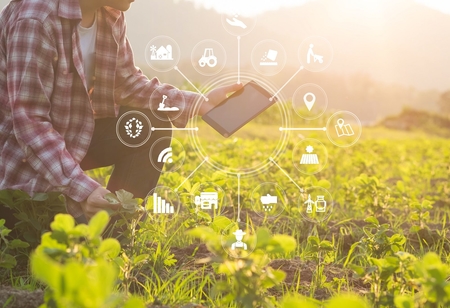One industry which has been blooming and making significant strides over the last few years is the Agriculture Technology domain. Although in its nascent stage, the Agritech sector is emerging as a strong growth driver when its comes to the economy of India.
With population increasing at an alarming rate, it has been reported that the agricultural output needs to grow at a whooping 60 percent rate by the year 2030. Hence, to attain this, technology will have a vital role in this juncture. Hence, every technology provider in the agriculture domain should start building a strong digital footprint so as to have a competitive edge which can enable them to meet the changing needs of both the farmers as well as the end-consumers.
Hence, here are some the technology that would significantly help the agriculture sector to grow and help sustain the increasing population:
Crop Monitoring Technologies
The very first step in improving the agriculture outcomes would be the adoption of crop monitoring technologies. Along with basic digitization to leverage data, focusing on on-farm data and agronomy management technology will significantly help farmers and other stakeholders to meet short/long-term goals.
Technologies such as remote sensing and satellite with image recognition software will enable the users or the farm managers to examine the crops from anywhere in the world - The mobile applications would allow these managers to send advisors to farmers/growers in a real-time basis and assess the impact of the recommendations made by these various technologies.
Making Informed Farming Decision using AI/ML
As mentioned above, these remote monitoring of fields would provide access to real-time information. This information needs a proper filtering so as to make these data into actionable insights. Hence, Advanced data analytics tools using the next-gen technologies such as AI/ML will enable agri-businesses, government agencies, and especially farmers to make more informed decisions.
And to top it off, the best side would be that, these decisions can now be made from not only a real-time approach, but as well as from a long-term perspective. There is also a scope to make real-time decisions that will impact the output in the same crop cycle as there will always be more long-term decisions that will affect the next crop cycle.
Make Food Production More Sustainable with the use of AI
As we are witnessing rapid advancements in next-gen technologies that include AI and ML. These technologies have been facilitating intelligent food production models and also the development of new business models which will enable food production to be climate-resilient, as well as at the same time traceable.
Now, even before planting the seeds, Machine Learning can provide indepth information about the genes and traits which are best suited for crop production, hence enabling farmers to only pick the best breeds of seeds for the plantation.
Furthermore,
ABB India has received the country's largest automation order in the agro-chemical sector, which will further nourish the Indian agriculture industry. G Balaji, Head - Energy Industries, Industrial Automation, ABB India said, "Adoption of such digitalisation technologies can help agro-chemical companies accelerate their overall business, increase profit margins, and cater to the burgeoning demand.”
